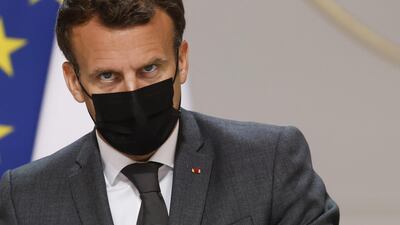Europeans have become "no more than bystanders" while serious crises have occurred on their doorstep, according to a major security report published on Wednesday.
From "the Maghreb to the Caucasus" the continent has failed to address important security issues to protect its own vital interests, the Munich Security Conference paper claimed.
The annual Munich Security Conference hosts world leaders for intensive debate on security challenges, in the world's largest gathering of its kind.
Its paper highlighted Libya, where powers from the Middle East, Russia and Turkey had intervened in an area that borders Europe, yet there was no united strategy from the EU.
“EU members cannot insulate themselves from the disarray in their neighbourhood,” the paper said.
Meanwhile, the continent is suffering major effects from Libya's turmoil, through refugees and the threat from terrorist groups like ISIS.
Libya’s turmoil also means that illicit networks are allowed to operate in North Africa, creating “a booming market for human smuggling and trafficking towards Europe”.
Similarly, the country’s oil supplies are now insecure.
But, the report said, some Europeans still regard North African countries as places that could "one day become important partners for efforts to diversify EU members' supply chains".
“The EU has shown a limited ability to assume a more proactive role and effectively protect its own vital interests, with Europeans being no more than bystanders in some of the gravest crises in their neighbourhood,” it said.
The report criticised the West for continuing "to exhibit a lack of joint action on crucial global issues".
While US President Joe Biden had declared that “America is back”, European leaders are failing to mention that they were willing to take on more responsibility, it claimed.
“Critics are irritated by a general lack of European proposals to tackle the items on a long transatlantic to-do list.
“Some already fear that Europe is missing another opportunity to resurrect the West. America is back, but where is Europe?”
With America providing the backbone of Nato, the continent remained "unable to provide for its own security for many years to come", it said.
This comes at a time when Washington is more focused on the Pacific and the threat of China.
The report recommended that the continent learns from East Asian countries that have increased co-operation to counter growing Chinese influence.
There was criticism of European hesitancy in dealing with the "autocratic assertiveness" of China and Russia.
While the Munich Security Index – an appendix to the main report on global risk – said that both countries pose a "major risk" to security, many European countries are wary of opposing them, economically or militarily.
With the climate crisis and arms race both spiralling out of control, there is now an urgency to get “at least a minimum level of global co-operation” to combat them, the report said.
It praised French President Emmanuel Macron for being among the few European leaders arguing for greater participation, quoting his remark that “we need more of Europe to deal with our neighbourhood”.
The report suggested that Europe should reach out to "like-minded partners across the globe", co-operating with a broader range of countries through either formal institutions or flexible frameworks.
There is also a need to get support for a “globally orientated but value-based multilateralism”.
It added that competition must not preclude co-operation, as “none of the major challenges for humanity can be met successfully by mere coalitions of the willing”.
The Covid-19 pandemic has also made it “painfully clear” how co-operation is hampered by geopolitical rivalries, the report said.
It further argued that broad-based collaboration is required to mitigate global warming. “To this end, the international community must urgently step up collective efforts to move away from carbon-intensive pathways.”
The authors suggested that if the climate approach was managed properly it could inspire “a race to the top” that would spur green investments and boost bold climate action.
“Competition and co-operation do not only coexist, they condition each other,” the report concluded.


